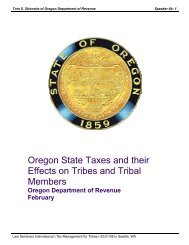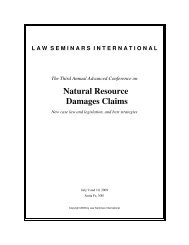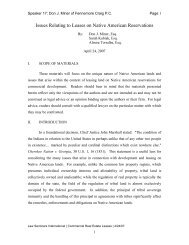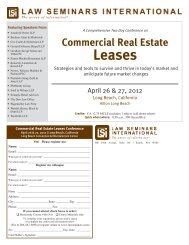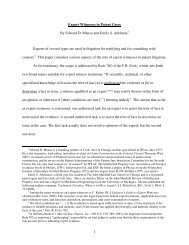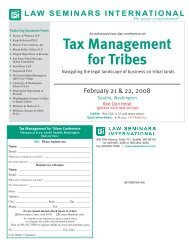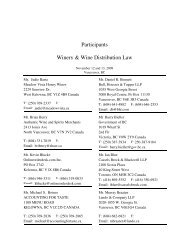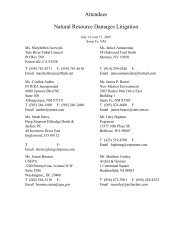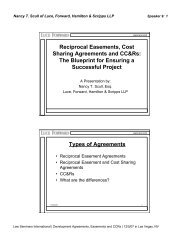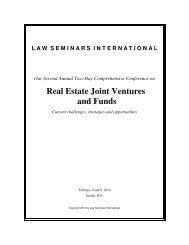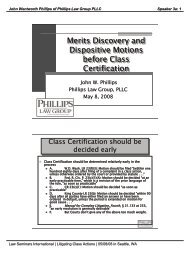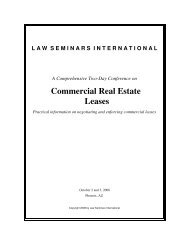- Page 1:
L A W S E M I N A R S I N T E R N A
- Page 4 and 5:
Thursday, July 15, 2010 Natural Res
- Page 6 and 7:
James A. Bruen, Richar
- Page 8 and 9:
Table of Contents Topic Speaker # C
- Page 10 and 11:
Faculty for Natural Resource Damage
- Page 13:
L A W S E M I N A R S I N T E R N A
- Page 16 and 17:
James A. Bruen of Farella Braun + M
- Page 18 and 19:
Richard O. Curley, Jr. of Curley &
- Page 20 and 21:
David J. Lazerwitz of Farella Braun
- Page 23 and 24:
John C. Cruden of U.S. Department o
- Page 25:
L A W S E M I N A R S I N T E R N A
- Page 28 and 29:
Brian D. Israel of Arnold & Porter
- Page 30 and 31:
Brian D. Israel of Arnold & Porter
- Page 32 and 33:
Brian D. Israel of Arnold & Porter
- Page 34 and 35:
Brian D. Israel of Arnold & Porter
- Page 36 and 37:
Brian D. Israel of Arnold & Porter
- Page 38 and 39:
Brian D. Israel of Arnold & Porter
- Page 40 and 41:
Brian D. Israel of Arnold & Porter
- Page 42 and 43:
Brian D. Israel of Arnold & Porter
- Page 44 and 45:
Brian D. Israel of Arnold & Porter
- Page 46 and 47:
Brian D. Israel of Arnold & Porter
- Page 48 and 49:
Brian D. Israel of Arnold & Porter
- Page 50 and 51:
Brian D. Israel of Arnold & Porter
- Page 53 and 54:
Brian D. Israel of Arnold & Porter
- Page 55 and 56:
Brian D. Israel of Arnold & Porter
- Page 57 and 58:
Brian D. Israel of Arnold & Porter
- Page 59 and 60:
Brian D. Israel of Arnold & Porter
- Page 61 and 62:
Brian D. Israel of Arnold & Porter
- Page 63 and 64:
Brian D. Israel of Arnold & Porter
- Page 65 and 66:
Brian D. Israel of Arnold & Porter
- Page 67 and 68:
Brian D. Israel of Arnold & Porter
- Page 69 and 70:
Brian D. Israel of Arnold & Porter
- Page 71 and 72:
Brian D. Israel of Arnold & Porter
- Page 73 and 74:
Brian D. Israel of Arnold & Porter
- Page 75 and 76:
Brian D. Israel of Arnold & Porter
- Page 77 and 78:
Brian D. Israel of Arnold & Porter
- Page 79 and 80:
Brian D. Israel of Arnold & Porter
- Page 81 and 82:
Brian D. Israel of Arnold & Porter
- Page 83 and 84:
Brian D. Israel of Arnold & Porter
- Page 85 and 86:
Brian D. Israel of Arnold & Porter
- Page 87 and 88: Brian D. Israel of Arnold & Porter
- Page 89 and 90: Brian D. Israel of Arnold & Porter
- Page 91 and 92: Brian D. Israel of Arnold & Porter
- Page 93 and 94: Brian D. Israel of Arnold & Porter
- Page 95 and 96: Brian D. Israel of Arnold & Porter
- Page 97 and 98: Brian D. Israel of Arnold & Porter
- Page 99 and 100: Brian D. Israel of Arnold & Porter
- Page 101 and 102: Brian D. Israel of Arnold & Porter
- Page 103 and 104: Brian D. Israel of Arnold & Porter
- Page 105: Brian D. Israel of Arnold & Porter
- Page 108 and 109: Brian D. Israel of Arnold & Porter
- Page 110 and 111: Brian D. Israel of Arnold & Porter
- Page 112 and 113: Brian D. Israel of Arnold & Porter
- Page 115: L A W S E M I N A R S I N T E R N A
- Page 118 and 119: David J. Lazerwitz of Farella Braun
- Page 120 and 121: David J. Lazerwitz of Farella Braun
- Page 122 and 123: David J. Lazerwitz of Farella Braun
- Page 124 and 125: David J. Lazerwitz of Farella Braun
- Page 126 and 127: David J. Lazerwitz of Farella Braun
- Page 128 and 129: David J. Lazerwitz of Farella Braun
- Page 131 and 132: Richard O. Curley, Jr. of Curley &
- Page 133 and 134: Richard O. Curley, Jr. of Curley &
- Page 135 and 136: Andrew O. Guglielmi of New York Sta
- Page 137: Andrew O. Guglielmi of New York Sta
- Page 141 and 142: Kenneth Jenkins of ARCADIS Speaker
- Page 143 and 144: Amy L. Horner of U.S. Department of
- Page 145: L A W S E M I N A R S I N T E R N A
- Page 148 and 149: Ira Gottlieb of McCarter & English,
- Page 150 and 151: Ira Gottlieb of McCarter & English,
- Page 152 and 153: Ira Gottlieb of McCarter & English,
- Page 154 and 155: Ira Gottlieb of McCarter & English,
- Page 156 and 157: Ira Gottlieb of McCarter & English,
- Page 158 and 159: Ira Gottlieb of McCarter & English,
- Page 160 and 161: Ira Gottlieb of McCarter & English,
- Page 163: L A W S E M I N A R S I N T E R N A
- Page 166 and 167: John Carlucci of U.S. Department of
- Page 168 and 169: Nathaniel Barber of New York State
- Page 170 and 171: Ken L. Frank of Chevron Environment
- Page 172 and 173: Ken L. Frank of Chevron Environment
- Page 174 and 175: Ken L. Frank of Chevron Environment
- Page 176 and 177: Ken L. Frank of Chevron Environment
- Page 179 and 180: Sheri L. Moreno of General Electric
- Page 181 and 182: Sheri L. Moreno of General Electric
- Page 183: Sheri L. Moreno of General Electric
- Page 187 and 188: John K. Dema of Law Offices of John
- Page 189 and 190:
John K. Dema of Law Offices of John
- Page 191 and 192:
John K. Dema of Law Offices of John
- Page 193 and 194:
John K. Dema of Law Offices of John
- Page 195 and 196:
John K. Dema of Law Offices of John
- Page 197 and 198:
John K. Dema of Law Offices of John
- Page 199 and 200:
John K. Dema of Law Offices of John
- Page 201 and 202:
John K. Dema of Law Offices of John
- Page 203 and 204:
John K. Dema of Law Offices of John
- Page 205:
John K. Dema of Law Offices of John
- Page 208 and 209:
Bill Jackson of Jackson Gilmour & D
- Page 210 and 211:
Bill Jackson of Jackson Gilmour & D
- Page 212 and 213:
Bill Jackson of Jackson Gilmour & D
- Page 214 and 215:
Bill Jackson of Jackson Gilmour & D
- Page 216 and 217:
Bill Jackson of Jackson Gilmour & D
- Page 218 and 219:
Bill Jackson of Jackson Gilmour & D
- Page 220 and 221:
Bill Jackson of Jackson Gilmour & D
- Page 222 and 223:
Bill Jackson of Jackson Gilmour & D
- Page 225 and 226:
Michael R. Thorp of Summit Law Grou
- Page 227 and 228:
Michael R. Thorp of Summit Law Grou
- Page 229 and 230:
Michael R. Thorp of Summit Law Grou
- Page 231 and 232:
Michael R. Thorp of Summit Law Grou
- Page 233 and 234:
Michael R. Thorp of Summit Law Grou
- Page 235 and 236:
Paul D. Boehm of Exponent, Inc. Spe
- Page 237 and 238:
Paul D. Boehm of Exponent, Inc. Spe
- Page 239 and 240:
Paul D. Boehm of Exponent, Inc. Spe
- Page 241 and 242:
Paul D. Boehm of Exponent, Inc. Spe
- Page 243 and 244:
Paul D. Boehm of Exponent, Inc. Spe
- Page 245 and 246:
Paul D. Boehm of Exponent, Inc. Spe
- Page 247 and 248:
Paul D. Boehm of Exponent, Inc. Spe
- Page 249:
Paul D. Boehm of Exponent, Inc. Spe
- Page 253 and 254:
Linda R. Larson of Marten Law PLLC
- Page 255 and 256:
Linda R. Larson of Marten Law PLLC
- Page 257 and 258:
Linda R. Larson of Marten Law PLLC
- Page 259 and 260:
Linda R. Larson of Marten Law PLLC
- Page 261:
Linda R. Larson of Marten Law PLLC
- Page 265 and 266:
Allan Kanner of Kanner & Whiteley,
- Page 267 and 268:
Allan Kanner of Kanner & Whiteley,
- Page 269 and 270:
Allan Kanner of Kanner & Whiteley,
- Page 271 and 272:
Allan Kanner of Kanner & Whiteley,
- Page 273 and 274:
Allan Kanner of Kanner & Whiteley,
- Page 275 and 276:
Allan Kanner of Kanner & Whiteley,
- Page 277 and 278:
Allan Kanner of Kanner & Whiteley,
- Page 279 and 280:
Allan Kanner of Kanner & Whiteley,
- Page 281 and 282:
Allan Kanner of Kanner & Whiteley,
- Page 283 and 284:
Allan Kanner of Kanner & Whiteley,
- Page 285 and 286:
Allan Kanner of Kanner & Whiteley,
- Page 287 and 288:
Allan Kanner of Kanner & Whiteley,
- Page 289 and 290:
Allan Kanner of Kanner & Whiteley,
- Page 291 and 292:
Allan Kanner of Kanner & Whiteley,
- Page 293 and 294:
Allan Kanner of Kanner & Whiteley,
- Page 295 and 296:
Allan Kanner of Kanner & Whiteley,
- Page 297 and 298:
Allan Kanner of Kanner & Whiteley,
- Page 299 and 300:
Allan Kanner of Kanner & Whiteley,
- Page 301 and 302:
Allan Kanner of Kanner & Whiteley,
- Page 303 and 304:
Allan Kanner of Kanner & Whiteley,
- Page 305 and 306:
Allan Kanner of Kanner & Whiteley,
- Page 307 and 308:
Allan Kanner of Kanner & Whiteley,
- Page 309 and 310:
Allan Kanner of Kanner & Whiteley,
- Page 311 and 312:
Allan Kanner of Kanner & Whiteley,
- Page 313 and 314:
Allan Kanner of Kanner & Whiteley,
- Page 315 and 316:
Allan Kanner of Kanner & Whiteley,
- Page 317 and 318:
Allan Kanner of Kanner & Whiteley,
- Page 319:
Allan Kanner of Kanner & Whiteley,
- Page 322 and 323:
Angus Macbeth of Sidley Austin LLP
- Page 324 and 325:
Angus Macbeth of Sidley Austin LLP
- Page 326 and 327:
Angus Macbeth of Sidley Austin LLP
- Page 328 and 329:
Angus Macbeth of Sidley Austin LLP
- Page 331 and 332:
Angus Macbeth of Sidley Austin LLP
- Page 333 and 334:
Angus Macbeth of Sidley Austin LLP
- Page 335 and 336:
Angus Macbeth of Sidley Austin LLP
- Page 337 and 338:
Angus Macbeth of Sidley Austin LLP
- Page 339 and 340:
Angus Macbeth of Sidley Austin LLP
- Page 341 and 342:
Angus Macbeth of Sidley Austin LLP
- Page 343 and 344:
Angus Macbeth of Sidley Austin LLP
- Page 345 and 346:
Angus Macbeth of Sidley Austin LLP
- Page 347 and 348:
Angus Macbeth of Sidley Austin LLP
- Page 349 and 350:
Angus Macbeth of Sidley Austin LLP
- Page 351 and 352:
Angus Macbeth of Sidley Austin LLP
- Page 353:
Angus Macbeth of Sidley Austin LLP
- Page 357 and 358:
Robert E. Unsworth of Industrial Ec
- Page 359 and 360:
Robert E. Unsworth of Industrial Ec
- Page 361 and 362:
Robert E. Unsworth of Industrial Ec
- Page 363 and 364:
Robert E. Unsworth of Industrial Ec
- Page 365 and 366:
Rick Dunford of Environmental Econo
- Page 367 and 368:
Rick Dunford of Environmental Econo
- Page 369 and 370:
Rick Dunford of Environmental Econo
- Page 371:
Rick Dunford of Environmental Econo
- Page 374 and 375:
William H. Desvousges of W. H. Desv
- Page 376 and 377:
William H. Desvousges of W. H. Desv
- Page 378 and 379:
William H. Desvousges of W. H. Desv
- Page 380 and 381:
William H. Desvousges of W. H. Desv
- Page 383 and 384:
Donald W. Fowler of Hollingsworth L




